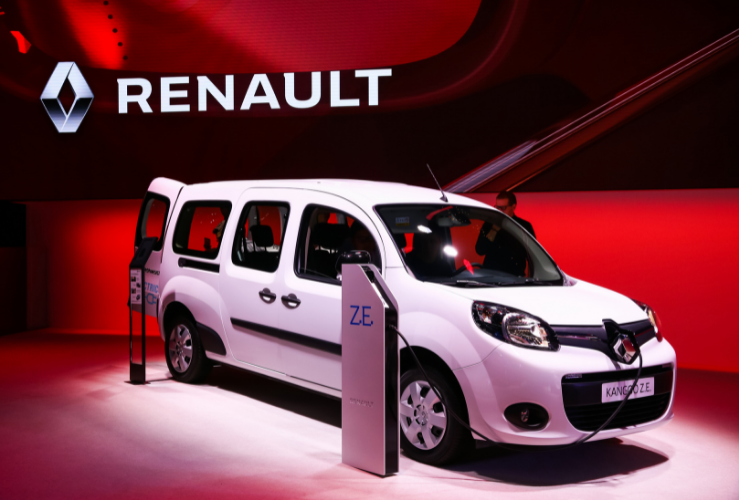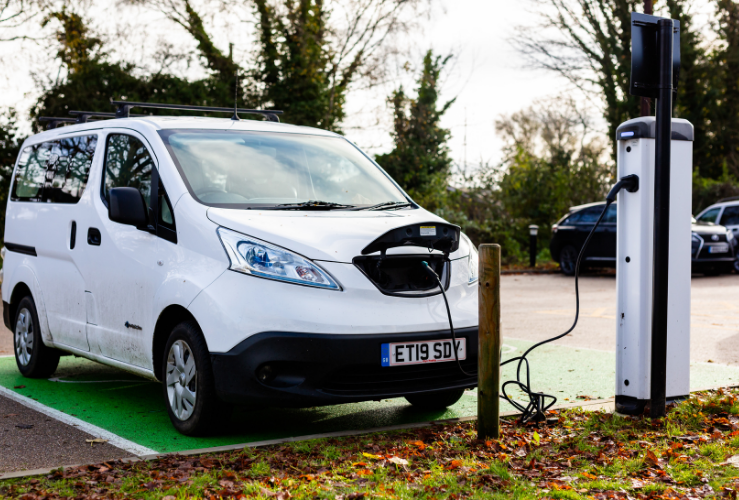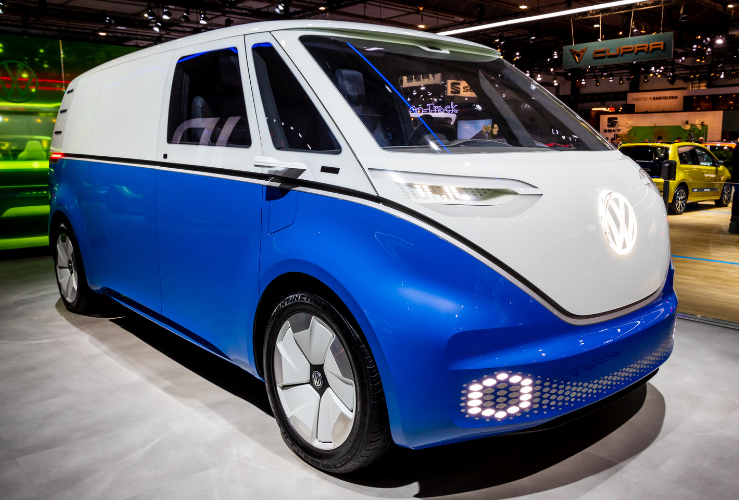Are there any electric vans?
The short answer is, yes! There are a number of electric vans available on the market.
By the end of 2020, there were only a handful of electric vans available on the UK market. But by the end of 2021, there were more than 20 fully electric vans on sale - comprising more than 70 variants.
The once-common query - are there any electric vans? - has gone the way of the dodo.
And this surge in choice has been well received, with 140%+ increase in sales of electric vans by the close of 2021.
It’s clear that the world of electric vans is moving almost as quickly as that of the electric car market.
But is now the right time for you to buy an EV van? And what electric vans are available for your needs?
Red on to help you decide which EV van is right for you…

Corporate take-up only for EV vans?
Much of the increase in e-van sales is down to corporate customers, particularly in relation to the Vauxhall Vivaro-e and electrified Mercedes-Benz Sprinters and Vitos - considered to be among the best EV vans out there.
But it’s not all about big corporate buyers. Maxus, a Chinese maker of electric vans, has been steadily gaining market share - and is popular with both corporate and small business owners.
The price pain-point of electric vans
For most would-be electric van buyers, price is a key factor. As such, companies like Maxus have been making ground in part by keeping prices low.
The arrival of e-van 'pretenders' like Maxus may maintain the pressure on more established van makers like Renault and Nissan to keep on innovating.
What about government grants for electric vans?
The UK government does provide a grant towards the cost of a new electric van. The model must be included on one of these Low-emission vehicles eligible for a plug-in grant., and the RRP must be below £32,000 inclusive of VAT and delivery fees.
Government EV grants for small vans
For small vans, the grant will pay for 35% of the purchase price, up to a maximum of £2,500.
Government EV grants for large vans
For large vans, the grant will pay for 35% of the purchase price, up to a maximum of £5,000.
EV grants are automatically taken off the price by the retailer.
Which size electric van?
Small electric van
If you're in the market for a small electric van, your choice is rather limited.
For a small electric van, it really comes down to either the Vauxhall Combo-e (which is essentially the same platform as electric variants of the Berlingo and Partner) and the Zoe e-tech van. Thankfully, both are rather good.
This dearth of choice compares to dozens of petrol and diesel-fuelled small vans, which include the Vauxhall Combo, the Ford Transit Connect, and the Vauxhall Caddy.
Medium sized electric vans
The medium-size e-van space has been dominated by the Vauxhall Vivaro-e, with strong competition from the Citroen e-Dispatch, Peugeot e-Expert, Toyota Proace Electric, Mercedes-Benz Vito, and VW Transporter ABTe.
At the smaller end of the medium segment is the Maxus e Deliver 3.
Typically, a medium size e-van can carry about a tonne and most come with DC charging.
Large electric van
For those who need more space, the Mercedes Benz Sprinter is available in electric form, as is the MAN TGE, the Vauxhall Movano, the Fiat e-Ducato, and the Maxus e Deliver 9.
These larger vans do come at a cost, which is why mostly larger delivery firms have invested in them.
For smaller businesses or sole traders, it might be challenging to justify the price - unless business is booming.
How much is an electric van?
When it comes to large electric van costs, a regular combustion-engine Mercedes Benz Sprinter OTR starts from £31,200, while the e-Sprinter version starts from £51,950.
 Credit: art_zzz - stock.adobe.com
Credit: art_zzz - stock.adobe.com
The same vans with different badges?
Due to the cost of developing electric vehicles, manufacturers have teamed up to spread the risk.
The result is products like the Renault Kangoo, Nissan Townstar and Mercedes-Benz eCitan - all of which are built around the same platform (and are due out in 2022).
Because of this similarity, these brands have been forced to differentiate themselves with things like extended warranties, attractive finance deals and in-life services.
In short, competition does seem to be driving excellence.
And while this approach may appear to offer less choice overall, the savings made by manufacturers in development costs mean they can sell the final product at a lower price.
Looking for an electric van with character?
The Morris J-Type van is set to have a revival, with the release of a new electric version of the vehicle in the pipeline.
With the J type having been out of manufacture for over 50 years, the new electric j type van is sure to raise an air of nostalgia amongst many – after all, the original J type van was a popular choice of transportation amongst many businesses in post war Britain, including Royal Mail, Cadbury, John Lewis, OXO and Wall’s.
With a range of approximately 200 miles and payload of 1 tonne, it will cost around £60,000 to purchase the electric J type van when it goes on sale.
How far can an electric van go?
For would-be e-van buyers, range anxiety is a big issue. However, manufacturers are tackling it head-on, with the forthcoming VW ID. Buzz Cargo boasts a whopping 250 miles of range.
Electric vans with longest range: Top 5
- VW ID. Buzz Cargo – 250 miles (coming soon)
- Renault Zoe Van – 239 miles
- Citroen e-Dispatch / Fiat eScudo / Peugeot e-Expert / Toyota Proace Electric / Vauxhall Vivaro-e – 205 miles
- Ford E-Transit – 196 miles
- Renault Kangoo E-Tech – 186 miles

Credit: Collins Photography - stock.adobe.com
How long does it take to charge an electric van?
Charging speed, too, has improved a great deal.
For instance, the Citroen Berlingo Electric can achieve an 80% charge in just 30 minutes (when plugged into the appropriate rapid charger). And with the Zoe E-Tech electric van, you can get up to 90 miles of range in 30 minutes with a 50 kW DC charger.
For busy delivery companies and small businesses, such a quick-charging van is a must.
How much could I save on fuel?
A key advantage to buying an electric van is that you can say goodbye to fuel bills.
Over time, these savings will add up. For example, as Renault states: "Over four years Zoe Van can generate savings of up to £5,000 compared to a similarly sized van with a traditional engine."
Do electric vehicles cost less to service?
According to some research, annual tax and maintenance costs (including MOTs and servicing) for electric vans is 49% lower than comparable petrol models.
As well as less direct maintenance costs, it means less time spent in the garage - which for busy people is a massive plus-point.

Credit: VanderWolf Images - stock.adobe.com
Do electric vans pay congestion charges?
Another advantage is that all pure electric cars are exempt from the London Congestion Charge, as well as the Ultra Low Emission Zone (ULEZ) charge.
Don’t forget, the sale of petrol/diesel vans will be banned by 2030
By 2030, you will only be able to buy pure electric vans (hybrid sales will be permitted until 2035), so it’s worth thinking about when you’ll make the switch.
So, is it time to buy an electric van?
There are many more electric vans to choose from in 2022 than there were just a year ago.
This choice, combined with better range and quick charging, has made buying an electric van more attractive than ever.
But as with so many things, it may come down to cost. The initial outlay for many electric vans is significant, and it would take time for those cost savings to add up.
For those with the available funds, now could be a great time to invest in an electric van. For others, it might make sense to wait for prices to come down, and in the meantime keep running their combustion-engine vans - at least until that dreaded 2030 deadline arrives!
What about electric cars?
Not in the market for an electric van but considering buying an electric car?
If you’re wondering, is an electric car right for me? Why not read our article Is it time to buy an electric car?




